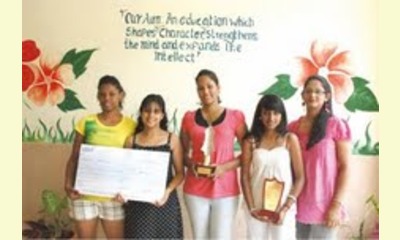|
|
‘Education for peace’ wins the Youth Excellence Award 2011 in Mauritius.
un article par Priya Baligadoo, in relation to article in Le Mauricien
The students of Port Louis State Secondary School (Girls) in Mauritius have been rewarded for their project ‘Education for Peace’ in the category ‘Family life and Human Values’ at the Youth Excellence Award 2011 piloted by the Ministry of Youth and Sports. They have distinguished themselves in this competition through their efforts, commitment and dedication in furthering a culture of peace.

click on photo to enlarge
Under the supervision of Priya Baligadoo, UNESCO Fellow in peaceful conflict resolution, these youngsters are being empowered to resolve problems in a peaceful manner. A workshop was even organised to enable parents, teachers and students to voice out problems encountered at family and school level.
The student Nivesha Bisram remarks: ‘in that workshop, we communicated our vision, took advice and tried to understand our parents.’ In the same line, Venisha Seenivasagen points out that ‘youngsters have many problems and parents do try their best to help them. We should cooperate with them and encourage dialogue’.
At the school, the key word is partnership. Links are being established with the community to enable developmental projects for peace. The students have constituted a UNITY Group with the aim to break barriers between departments and initiate collaborative actions with parents and students for a better quality education.
In an education system which is considered to be highly academic and which may disadvantage students with lower order skills, Port Louis S.S.S is paving the way for an inclusive pedagogy. This has been facilitated by the recent introduction of the ‘Activity Period’ by the Ministry of Education and Human Resources for a holistic development of the child. Hence, at the school, ‘Education for Peace’ is being translated into action. In the process, the skills, talents and potentials of students are being put to use and reflected through the school culture, ethos and environment.
For instance, various cozy corners have been created by students and teachers to create a friendly and peaceful atmosphere. Each block of the school has been named after human values like peace, non-violence, harmony and solidarity. Boards with inspirational quotes are seen everywhere to pass on positive messages. Similarly, regular newsletters are being emailed to students, parents and teachers as part of a sensitization campaign for capacity-building. The students even composed a song as a way to encourage other youngsters to work for peace. Says Valérie Perrine; ‘Our aim now is to encourage those outside our school community to initiate similar actions’.
At Port Louis S.S.S. then ‘Education for Peace’ is seen as a way to empower youths for a better future. Becoming conscious of their responsibilities, demonstrating an independent thinking, taking co-ownership of their learning and initiating positive developments, the UNITY Group has proved wrong any clichés that we may have of youths being irresponsible and immature. Thanking the students, teachers and parents for their collaborative work, Mrs. Ramburrun, the rector remarks that ‘the school is a community. We live like a family and do our best to inculcate in our youngsters the importance of civic responsibility.’
(Click here for the French article on which this is based.)
|








|
DISCUSSION
Question(s) liée(s) à cet article:
Peace Studies in School Curricula, What would it take to make it happen around the world?
* * * * *
Commentaire le plus récent:
During the Asian Educators Symposium, we found out that Peace Education is still not part of the school curriculum in most countries. However, the participating teachers have been incorporating peace education in their teaching subjects, such as English, social studies, and character education. We all agreed that love and the will to nurture peace in children are the most important basis for peace education. Even if peace education is not a part of the curriculum, peace can be taught through any subject. Whatever you are teaching, if it comes from the heart, then it will touch the minds of children.

|
|









